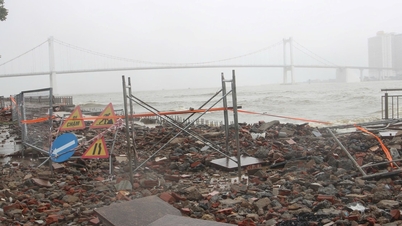Mr. Nguyen Quang Huy - CEO of the Faculty of Finance and Banking (Nguyen Trai University) said that in the short term, the above regulation may cause the market to temporarily stagnate, especially in the primary segment and projects in the early stages of capital mobilization. Some investors using short-term leverage will have their opportunities narrowed, and liquidity will decrease slightly.
However, in the medium and long term, this is a necessary purification process: credit flows will be regulated towards real buyers and real projects; the quality of bank collateral will be improved and market confidence will be strengthened on a more transparent and stable basis.
If implemented in a coordinated manner, with clear guidelines, transparent blocking mechanisms and standardized risk control processes, this policy will not only prevent capital flows but also create a safer operating framework for banks, businesses and buyers. From there, the real estate market can move from the stage of “growth based on leverage” to “development based on real financial capacity and real value of assets”.

Mr. Huy further analyzed that the State Bank of Region 2 requires banks to stop lending deposit payments Using a "written agreement" (or similar form) when purchasing real estate is a strategic credit regulation measure, demonstrating the prudent direction of the management agency in controlling risks and directing capital flows back to sustainable development goals.
In essence, this is not an extreme tightening action but a necessary adjustment step to ensure the safety of the financial and banking system, while restoring discipline to the real estate market after a period of hot growth and high leverage.
In real estate credit practice, banks usually only lend 50-70% of the appraised value of the property and only disburse when the customer has completed the equity capital. However, recently there has been a phenomenon of some customers borrowing capital to pay the deposit - the stage when the property has not yet been formed, the project has not yet met legal conditions, or even only exists in the form of a reservation agreement or an initial deposit contract.
At that time, banks disbursed loans based on "agreements" that lacked a clear legal basis, causing credit flows to enter high-risk areas, easily leading to disputes and bad debts.
Not only that, deposit lending also inadvertently fuels speculative activities, when some investors use the same amount of capital to deposit many different products, expecting the bank to continue to disburse according to the ratio.
This leverage cycle creates a large investment demand, contributing to price increases, strongly affecting the supply-demand balance, making the market susceptible to overheating. When the trend reverses, leverage transactions quickly withdraw, leading to the risk of deposit cancellation, payment suspension, putting pressure on investors and increasing risks for the credit system.
In that context, the suspension of deposit loans can be considered a reasonable precautionary step, helping the market return to a healthy financial orbit. This policy aims to protect real home buyers, forcing transactions to return to a standard legal foundation: only when the project is eligible for sale, the property is transparently valued, will the bank grant credit and disburse according to progress. Buyers must have a corresponding amount of equity, thereby considering more carefully before making a deposit, minimizing the risk of getting caught up in projects that are not legally complete or have complicated contracts.
Sharing the same view, Mr. Le Hoang Chau, Chairman of the Ho Chi Minh City Real Estate Association (HoREA), also said that requiring credit institutions not to lend or pay deposits to carry out future transactions that at the time of deposit did not meet the conditions is necessary.
" In cases of illegal subdivision and sale of land or apartment projects that have not completed the foundation and do not meet the conditions for capital mobilization according to regulations, customers will not be able to borrow capital to make a deposit. This is to protect the legal and legitimate rights and interests of customers who buy or lease real estate and future housing, and to contribute to building a healthy real estate market ," said Mr. Le Hoang Chau.
Mr. Giang Anh Tuan - Director of Tuan Anh Real Estate also expressed his agreement with this new requirement, because this will help purify the market, reduce risks for both banks and borrowers. Mr. Tuan shared more, investors who do not have enough legal status to sell products must mobilize capital through the deposit channel. Therefore, tightening lending will help eliminate investors with weak finances.
As for customers who borrow right from the deposit stage, it also shows that their financial potential is weak, and they are speculators "catching thieves with bare hands". Tightening the loan payment for deposit can reduce the group of speculative buyers, surfers and those who do not have real housing needs, thereby helping home buyers with real needs to get closer to the opportunity to own a house.
According to him, this requirement is to strictly control the purpose of capital use of borrowers and control credit risks.
For projects that at the time of deposit are eligible for implementation according to the provisions of law, credit institutions still lend to pay deposits to carry out normal future transactions. Therefore, this is not a capital tightening measure, so the real estate market will not be affected much.
Real estate businesses that comply with the law are not affected because future real estate and housing projects that meet the conditions for capital mobilization can still be used by customers to borrow credit to pay deposits.

Previously, expressing his opinion on this issue, economic expert, Dr. Dinh The Hien also stated that the operating principle of banks is to have risk management. Banks usually only lend according to the nature of the case. Moreover, the initial deposit is very low and is only the beginning, if the real estate buyer does not have it, how can the bank dare to lend?
The cancellation of deposits and real estate that does not meet the conditions to complete legal procedures is normal and happens a lot in reality. At that time, this loan will be too risky to become bad debt for the bank.
According to him, investment activities such as deposits and initial capital contributions are not worth lending to banks. As well as the regulations to prove financial capacity when sending children to study abroad, guaranteeing capital contribution to establish a business, but banks lend, it loses the meaning of proving financial capacity for these activities.
Therefore, this work is necessary and given in more detail to increase the safety of the banking system, without affecting the general lending situation of banks or the real estate market.
Source: https://baolangson.vn/siet-cho-vay-dat-coc-bds-thi-truong-co-the-chung-lai-nhung-ngay-cang-minh-bach-5062732.html



![[Photo] Prime Minister Pham Minh Chinh chairs conference on breakthrough solutions for social housing development](https://vphoto.vietnam.vn/thumb/1200x675/vietnam/resource/IMAGE/2025/10/24/1761294193033_dsc-0146-7834-jpg.webp)
![[Photo] President Luong Cuong chaired the welcoming ceremony and held talks with United Nations Secretary-General Antonio Guterres](https://vphoto.vietnam.vn/thumb/1200x675/vietnam/resource/IMAGE/2025/10/24/1761304699186_ndo_br_1-jpg.webp)
![[Photo] Prime Minister Pham Minh Chinh and South African President Matamela Cyril Ramaphosa attend the business forum](https://vphoto.vietnam.vn/thumb/1200x675/vietnam/resource/IMAGE/2025/10/24/1761302295638_dsc-0409-jpg.webp)
![[Photo] Solemn funeral of former Vice Chairman of the Council of Ministers Tran Phuong](https://vphoto.vietnam.vn/thumb/1200x675/vietnam/resource/IMAGE/2025/10/24/1761295093441_tang-le-tran-phuong-1998-4576-jpg.webp)


































































































Comment (0)